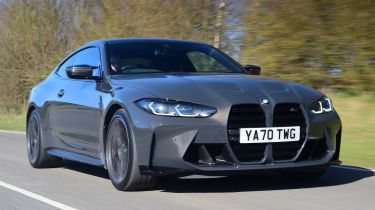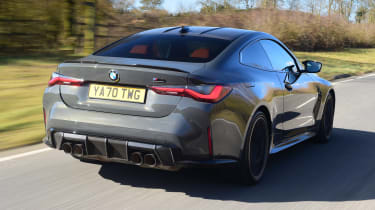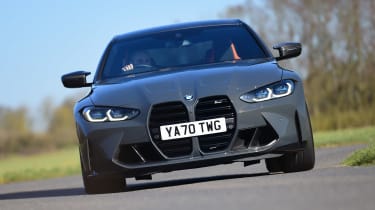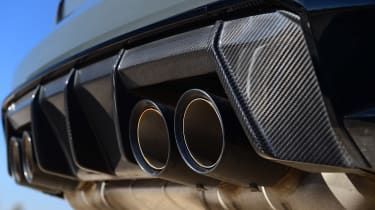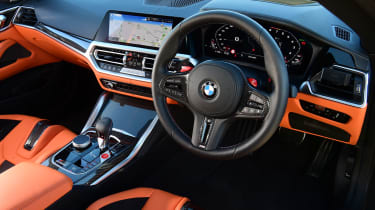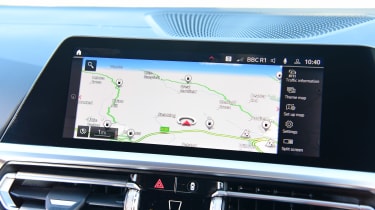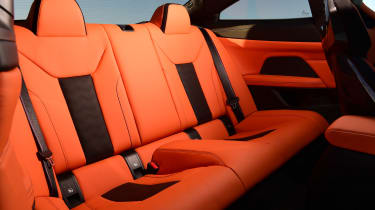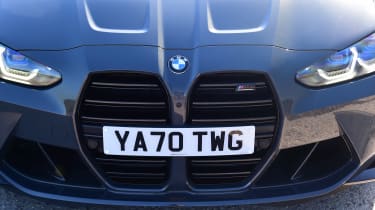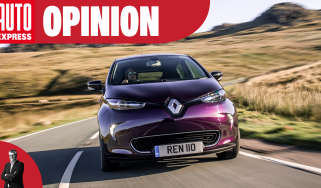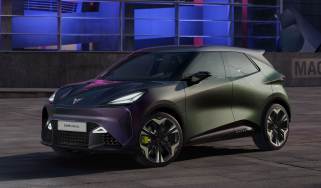BMW M4 review
The latest M4’s performance is well into the supercar league, but you’ll pay handsomely for the privilege

Our opinion on the BMW M4
At the expense of some tactility and everyday fun, today’s BMW M4 is the most serious performance car yet in its long lineage, with monstrous performance and balanced handling that makes use of, rather than suffers from, BMW’s decision to give this latest generation all-wheel drive.
The M4 is now a big car, with a big price tag to match, and it’s the smaller BMW M2 that delivers an experience closer to the M3s of old, but there’s no doubt the M4 remains a special and highly capable machine, whether on road or track.
About the BMW M4
It's always quite an occasion when a new M car comes along, but the arrival of the latest BMW M3 and M4 in 2020 was perhaps the most anticipated in a generation. That front end design remains a touchy subject, but viewed from a mechanical as well as a marketing point of view, the latest M4 has also undergone quite a shift.
The big news under the skin was that in this latest generation, the M4 has gone four-wheel-drive, while UK buyers are also restricted to the flagship Competition models as an entry point. This started out at 503bhp but was later bumped up to the current 523bhp, while in 2025 BMW launched the M4 CS with 543bhp, a little less weight, and a more focused dynamic setup.
Used - available now

2024 BMW
4 Series
42,976 milesAutomaticPetrol2.0L
Cash £29,990
2026 BMW
4 Series
72,500 milesAutomaticPetrol2.0L
Cash £22,279
2020 BMW
4 Series
42,540 milesAutomaticDiesel3.0L
Cash £18,850
2021 BMW
4 Series
46,826 milesAutomaticPetrol2.0L
Cash £26,457As ever, the M4 coupe and convertible sit alongside the M3 range (offered as a saloon and now an estate, also in Competition and CS variants), and between the smaller M2 and the larger (and now hybrid) M5. The modern M4 is itself as big as some older M5s and a lot more powerful, but it remains a focal point of the BMW Motorsport range.
The basic ingredients are still typical to the model though, all-wheel drive system excepted. Drive is still sent predominantly to the rear wheels even now, there’s still an inline six up front, and the M4 is still several steps dynamically and technically above a regular 4 Series Coupe.
Our tests of the car have continuously confirmed that it remains a seriously impressive driving machine. We’ve tested the M4 numerous times in the UK and Europe over the years, including twin tests of the M4 Convertible against the Porsche 911 and the hardcore M4 CSL against the Porsche Cayman GT4 RS. It’s not as tactile and involving as it used to be, perhaps – old M3s set a very high bar to reach there – but this is a practical four-seater that can still go toe-to-toe with dedicated sports cars and even supercars on a race track or testing section of road. It will be interesting to see how the future M4 might top it.
BMW M4 prices and latest deals
The other standout feature of the latest M4 is its price, and not necessarily for good reasons. A basic M4 Competition now costs more than £91,000 – commensurate with its performance, but a few steps ahead of where older M4s and M3 coupes would be, adjusted for inflation.
Opt for the M4 CS and that figure balloons to more than £122,000, which puts the M4 deeper into Porsche 911 territory than any previous model, special versions like the M4 GTS excepted (though the short-lived M4 CSL, offered from 2022-2023, was even more, at nearly £129,000).
Performance & driving experience
Pros |
|
Cons |
|
The M4 range is currently split between two variants, the M4 Competition and the M4 CS. Both use the same 3-litre turbocharged inline six, and the same eight-speed automatic transmission (a six-speed manual is available, just not in the UK) and all-wheel drive system for that matter, but there’s a step in power and torque figures from one to the other.
In Competition form you get 523bhp at 6,250rpm and 650Nm of torque between 2,750 and 5,730rpm, while the CS steps up to 543bhp at the same revs, and the same 650Nm, but produced in a slightly wider band – 2,750-5,950rpm.
Those numbers certainly don’t fall short against rivals, even if they’re fighting against a kerbweight that now tops 1,850kg – almost 400kg more than an E46 M3 and not far off 700kg more than the original E30 M3. Perhaps more pertinently, it’s still more than 100kg more than one of the least athletic versions of the Porsche 911, a Targa 4 GTS. Yet you’d be hard-pressed to feel it on the road, which is a sign of how well BMW has tuned its latest M4.
The xDrive all-wheel drive gets an Active M Differential at the rear axle, but also the driver-selected ability to operate in standard AWD, rear-biased AWD Sport, and a full rear-wheel drive mode. Other tech includes a ten-stage traction control system, and brake-by wire tech means the feel of the pedal can be adjusted too, along with usual driver selections like steering weight and damper stiffness.
| Model | Power | 0-62mph | Top speed |
| BMW M4 Competition | 523bhp | 3.5s | 155mph |
| BMW M4 CS | 543bhp | 3.4s | 188mph |
Performance, 0-60mph acceleration and top speed
High performance has always been a given in BMW’s M cars, but we’re still not quite used to seeing the on-paper acceleration figures of models like the BMW M4. In Competition form, 0-62mph is dispatched in 3.5 seconds, while the extra power and slightly lower weight of the CS sees it cut a tenth from that. A 155mph top speed is expected from a modern BMW but the CS eclipses that too, attaining 188mph if you’ve got a suitably empty autobahn at your disposal.
Behind the wheel there’s not a lot to separate them, but the more focused driver environment of the CS perhaps makes each squeeze of the throttle a little more exciting. You’d be hard-pressed to wish for more response, as the M4 in either form cracks forwards as soon as you ask for more power, and at full throttle the thrust feels relentless, all the way from idle to the limiter.
There’s just enough acceleration to distract you from the fact that the six-cylinder engine sounds more industrial and intense than it does musical, though the sports exhaust ensures most of the sounds reaching you are at least mechanically generated.
Town driving, visibility and parking
Despite its performance, the M4’s far from being difficult to drive – in most respects it’s like any other 4 Series. There’s enough steering assistance to make light work of manoeuvring at low speeds, and visibility is no worse than in the regular 4 Series.
Though the lower seating position of the CS’s bucket seats might make things trickier, despite there being plenty of adjustment, and the M4 can feel quite wide too. It’s an easy car to drive smoothly, though the M4’s ride is at its firmest around town – the springs and dampers feel tuned more for high-speed driving than urban plodding.
Country road driving and handling
Here’s where the M4 is in its element. What can feel like a large, heavy car at a canter suddenly wakes up when you push it a bit harder – the steering begins to deliver some feedback, the nose responds instantly and refuses to deviate from your chosen line, and you begin to feel the rear tyres working a little harder. The M4 is all-wheel drive, but the way it behaves is more like a rear-drive car – just one reined-in by some clever electronic controls, and with the extra traction benefits of all-wheel drive.
The CS is even more exciting, with every dynamic quality feeling just a little sharper. There’s even more grip at your disposal and the body feels even more locked down and resistant to lean. Some of the stiffness you feel at low speeds evaporates too, though on the average bumpy UK road, it’s still undoubtedly firm.
All the M4 really lacks is that last element of fun and involvement that separates a good car from a great one. You might get out of a fast drive in an M4 with sweaty palms, but the experience is more impressive than it is truly memorable.
Motorway driving and long-distance comfort
The M4 turns (mostly) back into a regular 4 Series when you want to cover any kind of distance. With the exception of some extra road noise from the wide performance-focused tyres and a little more resonance creeping into the body through the firmer suspension, the M4 settles down nicely at motorway speeds, and is never short of performance for a quick overtaking manoeuvre either.
“BMW’s M division hasn’t forgotten about the M4’s wilder side, and given the level of adjustability you have when it comes to the car’s key parameters, such as engine performance, gearbox ferocity, steering, brake feel and traction control, you can dial the M4 into delivering as much or as little performance as you like.” - Jonathan Burn, contributor
MPG & running costs
Pros |
|
Cons |
|
Few would buy a car like the BMW M4 expecting city-car running costs, but it’s impressive how parsimonious a modern car with well over 500bhp can be. Economy figures in the high 20s won’t win any awards from Greenpeace but they’re attainable numbers under gentle driving or on a motorway cruise.
If the petrol bills aren’t much of a concern, then the ability to cover a half-decent distance between fills should prove useful: with a 59-litre fuel tank, you’re looking at an easy 300 miles between visits to the petrol station, and more if you want to play fuel-light bingo.
Of course, there’s a rather large caveat to that: Start using the M4’s performance as the M division intended, and economy numbers tumble – our drives in the car suggest you’d be lucky to get 20mpg having fun on a twisty road.
Insurance should undercut some rivals, thanks to falling well shy of the maximum group 50 rating, and while tax won’t be cheap, depreciation won’t be too vicious either (even if the M4 doesn’t hold its value as well as a Porsche 911).
If anything is likely to cost a few bob, it’s consumables, since the M4’s weight and performance will have an impact on brakes and tyres. The M4 gets staggered 19 and 20-inch wheels as standard, with 275/35 and 285/30 rubber respectively – a set of Michelin Pilot Sport 4S tyres in those sizes comes in at about £300 a side at the front and £350 a side at the rear.
| Model | MPG | CO2 | Insurance group |
| M4 Competition | 28.2 | 226g/km | 42 |
| M4 CS | 27.7 | 232g/km | 47 |
Insurance groups
This probably won’t come as an enormous surprise, but the M4 is not a cheap car to insure. You’ll find the insurance groups towards the upper end of the 1-50 group scale. Though also, not right at the top – an M4 Competition starts in group 42, and even the CS is shy of the maximum rating, at group 47. Given every single Porsche 911 sits in group 50, that’s not bad going. Still, expect hefty insurance bills if your driving history isn’t spotless or if you’re relatively young.
Tax
First-year VED will probably sting a bit. CO2 emissions of 226g/km for the Competition and 232g/km for the CS land both M4s in the second-from-highest band, for a £4,680 bill in year one. It drops quite a bit from year two onwards, though as both also cost well over £40,000, you have to pay not just the standard £190 per year, but an extra £425 for the first five years too, meaning your bill in years two to six of registration will come to £615 a year (pending no changes in future government budget announcements). You probably won’t want to run the M4 as a company car – it’s in the maximum 37% band for 2025/2026, so tax will cost you thousands a year.
At least you won’t be stung for ULEZ if you’re a London-dweller as the M4’s new enough to meet the standards, but both versions are subject to the £15 Congestion Charge bill if you drive right into the centre.
Depreciation
After the industry standard 3 years/36,000 miles, you can expect the M4 Competition to retain around 43.5% of its original value, or around 40% if you’ve spent more on a car with the optional ‘Ultimate Pack’ – an eight-grand box-tick with adaptive LED headlights and a smattering of carbon, that doesn’t recoup its value when you sell, since both cars end up around the £40,000 mark. There are no depreciation figures for the M4 CS, though the car’s slightly more specialised nature might work in its favour.
Interior, design & technology
Pros |
|
Cons |
|
Pumped up front and rear wings, deeper bumpers, four exhaust tips, a carbon roof, and a set of arch-filling alloys are what differentiate the M4 from lesser 4 Series coupes. Depending on the colour the M4 can look surprisingly subtle (front grille aside) but there’s enough here to mark it out as a member of the M family – and it only takes a few minutes on the configurator, selecting different wheel designs or some of the more vivid colours, for the M4 to really stand out.
Those with a spare four grand to throw around can delve into BMW’s Individual programme for even wilder hues both inside and out, though even from the factory there are some pretty interesting combinations at your disposal. The Kyalami Orange and Yas Marina Blue leather seat options are particularly bold, and there appears to be little stopping you choosing either in combination with some of the brighter exterior colours, for something with all the subtlety of a 1990s shell suit – try combining Sao Paulo yellow paintwork with Yas Marina leather to see what we mean. Aluminium cabin trim is standard but you can upgrade that to carbon fibre, too.
Interior and dashboard design
If you’re familiar with recent BMWs then the M4’s cabin will look and feel right at home. The dash isn’t heavily canted towards you like BMWs of old – these days it’s more of a gentle curve, in both the dash and the wide touchscreen.
One familiar BMW feature that persists is the overly padded steering wheel rim, but you’ll at least find physical buttons on its spokes. There are more buttons alongside the gear selector, with the start-stop button and various switches to adjust the damping, exhaust, and other driver-controlled functions. It’s here you’ll find the traditional rotary iDrive control too.
We’re still not keen on BMW’s modern instrument style. The dials being TFT-only is something we’ll just have to get used to, but the bar-graph style speedometer and tachometer, which look like two unconnected sides of a hexagon, just aren’t especially easy to interpret at a glance, and frankly seem a bit naff – a shame when BMW’s instruments used to be a model of taste and clarity.
Materials and build quality
Where the build quality of some of BMW’s rivals seems to have taken a bit of a tumble recently, there are no such worries with the M4, which feels solidly constructed from the moment you interact with it. All the major touch-points and most visible surfaces are spot on and you won’t have to spend much time in contact with sub-par materials, though BMW hasn’t been able to resist a splash of fingerprint-attracting piano black plastic around the gear selector area.
BMW’s work to create a stiff structure has paid dividends too. Even considering the firm ride quality, there’s no sense that dashboard plastics are rattling or squeaking against each other. It’s tightly-constructed outside too, though like many modern cars, the need to make the front of the car relatively yielding for pedestrian impact regulations means parts of the front bumper can flex a little flimsily when you’re cleaning it.
Infotainment, sat-nav and stereo
All M4s get a wide, curved-screen setup with a 12.3-inch driver display and a larger 14.9-inch infotainment screen. At the time of writing, it’s running on BMW’s “Operating System 8.5”, which doesn’t mean much in isolation, and doesn’t really mean much in practice either – you’d need to be playing with it side-by-side to notice any differences with the slightly newer Operating System 9 used in certain other BMW models. The main difference is that 8.5 still gets a traditional rotary iDrive controller, something ditched in the later cars, though you can prod at the screen or use voice control too.
The infotainment has plenty of functionality built-in, and given it’s a bit of a nuisance to hook up an iPhone for Apple CarPlay (Android Auto is also available), it seems that BMW would prefer you used its own stuff. The menus and functions are all quick to access, if a bit cluttered – and the large screen can reflect off the windscreen at night.
Boot space & practicality
Pros |
|
Cons |
|
As with the 4 Series it’s based on, the BMW M4 comes in both coupe and convertible forms, each with two doors and four seats – though it’s closely related to the BMW M3, which comes not just as a saloon these days, but also as an estate for the first time. Even in coupe form though, the M4’s relatively conventional body shape means it’s among the more practical performance cars on sale, closer in utility to the likes of the Mercedes-AMG CLE 53 than a Porsche 911.
Dimensions and size
| Dimensions comparison | |||
| Model | BMW M4 | Mercedes-AMG CLE 53 | Porsche 911 |
| Length | 4801mm | 4853mm | 4542mm |
| Width | 1887mm | 1935mm | 1852mm |
| Height | 1389mm | 1434mm | 1302mm |
| Wheelbase | 2857mm | 2875mm | 2450mm |
| Boot space | 440 litres | 410 litres | 135 litres (plus 261 litres rear seats) |
The M4’s a big old bus these days. Not only does it weigh more than 1800kg, but it’s now 4.8 metres long too – an increase of about 130mm on its predecessor, and only about 120mm shorter than a BMW X5. It makes a Porsche 911 look almost tiny, given the Stuttgart sports car is smaller in every dimension, and it’s not like the 911 hasn’t itself grown over the years.
Transition from 4 Series to M4 has accounted for some of that growth – the M4 is 33mm longer, 35mm wider, and somehow 6mm taller than the standard car, despite lower, sportier suspension.
Luggage space is unaffected, and the interior’s just as spacious, though the M4’s carbon-backed sports seats eat into rear legroom a little more than the more conventional seats in the regular 4 Series.
Seats & passenger space
With a huge range of adjustment to both the seats and wheel, you’d have to be a particularly unusual shape not to be able to get comfortable in the front of an M4. Well, with one caveat: BMW’s current design of carbon-backed bucket seats has a large lump at the front of the seat base to divide your legs. It’s a bit of a racing car reference but a dubious one, as it’s not that wide and obstructive in actual racing seats with leg dividers, and a lot of drivers find it gets in the way of their legs in the M4. Long distance comfort though is excellent, and unlike a lot of bucket seats, they don’t require too much of a clamber over to access.
Anyone approaching six-feet tall will feel their head brush against the roof lining in the rear, but those pricey carbon fibre bucket seats do leave a nice amount of space for you to slide your feet beneath them – so it's more comfortable for adults back there than you might think.
Boot space
You get 440 litres of volume in the M4’s boot, unchanged from the regular 4 Series, and irrespective of whether you’re looking at the Competition or CS. While the traditional boot opening will limit the M4’s ultimate practicality (there’s an M3 Touring if you need a hatchback tailgate), 440 litres should be more than enough luggage space for most. It can easily swallow a couple of suitcases and you can drop the middle seat to load through longer items while transporting two people in the back at the same time.
Reliability & safety
Pros |
|
Cons |
|
BMWs have achieved mixed results in reliability surveys in the past, but the latest 4 Series had an encouraging finish in the 2025 Driver Power survey, coming seventh overall. While it didn’t trouble the top-scorers on build quality and reliability, it certainly wasn’t bad either, coming in 21st place out of the fifty cars that made up the table. It was also second place overall for the ease of deactivating systems like lane departure warning and speed limit chimes.
While the 4 Series’ result was behind that of the Mercedes-Benz C-Class (in fifth), it was well ahead of the Audi A5 (22nd place) and Tesla Model 3 (25th), both cars of similar price and market positioning. The M4 itself wasn’t surveyed, but as a member of the 4 Series family, you can expect similar levels of quality and reliability.
The BMW M4 hasn’t been officially tested by Euro NCAP, but the 4 Series Coupe it’s based upon has, so we’ve included the safety ratings for that car below, from its last appearance in 2019. While Euro NCAP’s testing procedure and requirements evolve over time, the 4 Series (and by extension the M4) is clearly a safe car, with particularly good results for adult occupant protection, and for vulnerable road user protection.
| Euro NCAP safety ratings | |
| Euro NCAP safety rating | 5 stars |
| Adult occupant protection | 97% |
| Child occupant protection | 83% |
| Vulnerable road user protection | 93% |
| Safety assist | 72% |
Buying and owning
- Best buy: BMW M4 Competition
Entertaining though it is, the extra expense of the M4 CS over the M4 Competition is difficult to justify – the jump from £91,000 to nearly £123,000 not only feels steep for a car whose best characteristics only really come out on track, but also puts the M4 among tougher competition in the Porsche range: right up there with the new 911 GTS, rather than undercutting a standard Carrera. If you can afford the extra then the CS is undoubtedly exciting, but the Competition is the more rounded car, and hardly short on performance.
Other than picking an appropriate colour and trim combination, we’d not delve too far into the options list either. If you plan on keeping the M4 for a while then BMW’s five-year Service Inclusive plan for £1,620 is probably worth selecting, and the driver training and experience element of the M Driver’s Pack (for £2,175) is probably more worthwhile than the raised 180mph limiter.
Want to splash out but still undercut the CS on price? £15,275 gets you the M Race Track Package, with the M carbon bucket seats, carbon ceramic brakes, a head-up display, and the M Driver’s Pack included.
BMW M4 alternatives
Neither Audi nor Mercedes fields a like-for-like rival for the M4 at the moment. Audi’s ditched its A5 coupe entirely, S5 and RS 5 included, and the Mercedes option, the AMG CLE53, is a little more of a cruiser than some AMG coupes of old – the 465bhp, hybrid-assisted inline six delivers a less raw experience than the BMW, and the appealing but also slightly chintzy cabin is more about flash than focus.
That leaves the M3 and M4’s old sparring partner, the Porsche 911, as probably the closest car in spirit. As a dedicated sports car rather than a pumped-up four-seater they do occupy slightly different corners of the market, enough that neither directly treads on the other’s toes, but for driver appeal they’re much closer.
The Porsche is a little more expensive out of the box (a basic Carrera now starts just shy of £104k) and despite vestigial rear seats and a deep front boot, it can’t match the M4 for practicality. But it’s also smaller, lighter, lower-slung and a lot less brash than the BMW, which may appeal to some.

